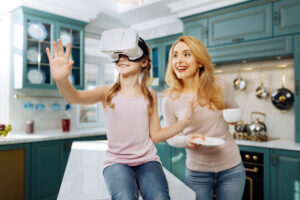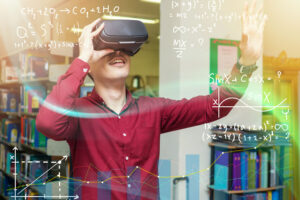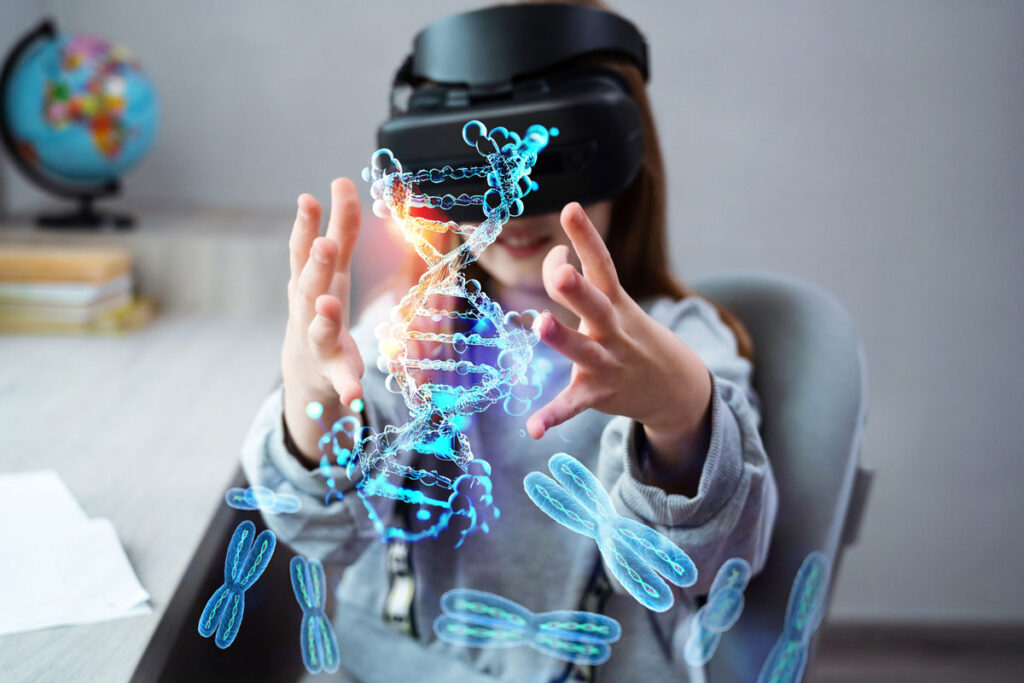By: Beverly Matoney | The Homeschoool Copywriter
For those home educators who spent their teenage years in traditional school settings, you understand the anxiety caused by certain social situations. Pain points, anyone?
Remember as an introvert feeling dread when asked to present your work in front of the class with no option to say no? Or how about that bully who made your high school experience horribly uncomfortable? Maybe you ended up doing all the work on a group project. Yikes.
And today’s schools have been overshadowed by even darker threats from outside.
No wonder some parents choose to homeschool. Of course, there are many reasons to teach your children at home, but memories of less-than-pleasant school years and the potential dangers of today’s institutional school settings may factor into your decision. And who could blame you?
Enter the innovative world of virtual reality education.
 Imagine a setting where your student can learn at their own pace in an environment of collaboration with a feeling of community.
Imagine a setting where your student can learn at their own pace in an environment of collaboration with a feeling of community.
Your student is safe at home with you while participating in group activities and experiences. They are shielded from physical bullying, and have enhanced emotional safety via controlled socialization opportunities.
Plus, virtual reality platforms offer a tailored learning experience personalized for your student. Exit school angst, enter relaxed learning for students around the world.
Advances in Virtual Reality in Education
Today’s virtual reality classrooms have been expanding and evolving, offering immersive and interactive experiences. Studies have shown the use of virtual reality technologies increase learning and help students recall abstract concepts better than listening to lectures in person or via a computer screen.
That’s just a fancy way of saying students learn better when they include movement and action along with taking in information via video or audio sources.
Specific insights gained from multiple studies include:
Enhanced student engagement and motivation: If you’re having trouble getting your student motivated to complete their schoolwork, you’ll find VR experiences capture your student’s attention and increase their interest and engagement in the subject matter.
Learning outcomes: Want your student to remember the information being presented? VR has a positive effect on knowledge acquisition, retention, and skills development. VR’s ability to simulate real-world scenarios and provide hands-on experiences can enhance learning outcomes.
Reduced anxiety and stress: When used as an educational tool, VR creates controlled and immersive environments to help students feel more comfortable and less anxious, potentially improving their overall well-being and reducing stress-related barriers to learning.
Socialization and collaboration: Studies have also shown that VR can create a sense of social presence, allowing students to connect and collaborate with peers and teachers in meaningful ways. This can be beneficial for homeschool students who may face socialization challenges.
Why Should You Include Virtual Reality Education in Your Homeschool?
In a homeschool setting, VR education:
 Provides an exciting and engaging way for students to learn, capturing their attention and making subjects come alive.
Provides an exciting and engaging way for students to learn, capturing their attention and making subjects come alive.
With VR education, your students can visit historical sites, explore the depths of the ocean, travel to different countries, or even journey into space—all from the comfort of your own home.
Promotes hands-on and experiential learning.
Students using VR can manipulate virtual objects, conduct virtual experiments, or solve interactive puzzles. This approach helps them develop critical thinking skills, problem-solving abilities, and a deeper understanding of complex concepts.
Offers flexibility and customization.
Homeschooling with VR allows you to customize your student’s learning experience based on their interests, needs, and learning style. You can access a wide range of educational content and programs designed specifically for virtual reality covering various subjects and grade levels.
Encourages collaboration and socialization.
Through virtual classrooms and online communities, your student can connect with peers, engage in group projects, and participate in real-time discussions. They are encouraged to work together on assignments, share ideas, and learn from one another, even though they may be physically distant.
But an important way virtual reality classes can positively impact your student’s homeschool experience is by creating a safe environment in which to learn.
Remember the angsty things we discussed? Virtual reality education offers a barrier against these issues.
How can virtual reality classrooms help my student with social anxiety?
For students who experience social or situational anxiety, VR homeschool classes can provide a more comfortable and less stressful learning environment. They can participate in virtual classrooms, engage with educational content, and interact with teachers and classmates without the pressure and anxiety that may arise in traditional physical classrooms.
Can virtual reality classes shield my student from bullying?
In a virtual reality homeschool environment, students are physically separated from their peers, which removes the risks associated with traditional schooling, such as bullying, physical altercations, or unsafe school environments. Your student can learn and engage with their peers within a controlled virtual space, reducing the potential for harm or discomfort.
Will my homeschool student be able to learn at their own pace in a virtual setting?
One of the finest features of homeschooling is the ability to allow your student to progress at their own pace and explore topics that interest them, and virtual reality platforms can offer these personalized learning experiences. This individualized approach can help your student build confidence and reduce the anxiety associated with struggling to keep up, feeling left behind, or being utterly bored in a traditional classroom setting.
How will my homeschool student gain social experience via virtual reality learning?
While VR homeschooling reduces in-person socialization, it can still provide monitored social interactions. Virtual classrooms and online communities enable your student to connect with peers who share similar interests and engage in collaborative learning projects and group work. These virtual socialization opportunities can help create friendships and social skills development in a safer and more inclusive space.
How can I be sure my homeschool student learns about diverse cultural ideas?
Since learning can take place anywhere in the world via virtual reality, consider how VR can connect your homeschooler with students from various geographic locations and cultural backgrounds they might not have otherwise met. This builds a broader educational environment and helps your student gain exposure to diverse perspectives and develop empathy, which can help reduce instances of bullying and encourage understanding and acceptance.
How can I be involved in my student’s virtual reality education?
In a VR homeschool setup, parents are typically more involved in their student’s education. This increased involvement allows you to create a supportive and nurturing learning environment providing personalized attention, guidance, and mentoring. Your involvement creates emotional safety and a strong sense of belonging for your student.
Overall, using virtual reality in your homeschool offers a wealth of positive enhancements to your home education program. Of course, it’s important to strike a balance between virtual interactions and real-world experiences.
Your student will receive a well-rounded education and enhanced social development both in your homeschool and by supplementing with virtual education experiences plus in-person social activities, extra-curricular activities, and community involvement.
Studies referenced:
https://www.sciencedirect.com/science/article/pii/S1747938X22000033
https://www.sciencedirect.com/science/article/pii/S2949678024000035
https://www.tandfonline.com/doi/full/10.1080/09523987.2023.2262195
“Virtual reality represents a new frontier in storytelling that allows us to step into someone else’s shoes and experience their perspective firsthand.” – Nonny de la Peña
About the Author: Beverly Matoney
Beverly Matoney is a wife, mother to two wonderful adult children, and writer living in northeast Georgia. She began her career in sales and marketing, but eventually opted for the stay-at-home life. When her oldest child was three, she and her husband decided homeschool was the best path for their family. That was way back in the early 90s when homeschool was just beginning to gain steam as an education alternative. But what an adventure it was!
Fast forward 20+ years, and their children have grown, graduated from homeschool, gone to college, and started their own lives. What’s a former home educator to do? She follows another dream she had of being a writer.



